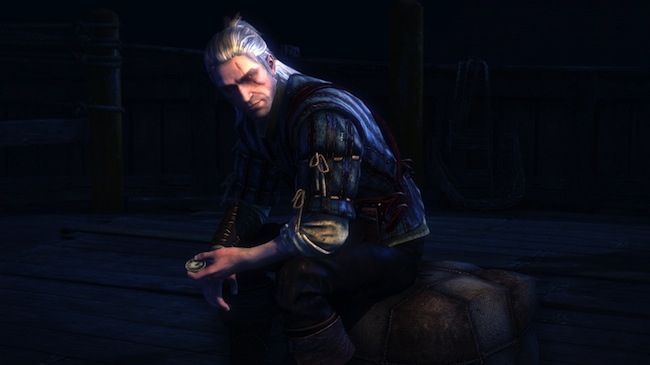
Geralt of Rivia from The Witcher 2: Assassins of Kings. Image by Namco, Atari, Warner Bros. via the official website
I’ve made no secret that I like video games, especially the sort of the RPG, sword and sorcery variety. Particularly the Dragon Age games. Sure, I’d like to say I rock Battlefield and Black Ops and whatnot, but the truth of the matter is, I’m really selective when it comes to most games. I think it’s a natural progression from my childhood, when Nintendo games like the Zelda and Mario franchises really shaped my particular brand of escapism. (Maybe that makes me a little narrow-minded, but I’d be lying if I said I’m RPG exclusive. I’ve been known to rock a Bond title now and again, and I still stand by my statement that Perfect Dark is one of the most excellent games known to man.)
But I digress. These days, my time is limited. Friends around my age (let’s say I’ll be coming of age relatively soon in hobbit years, okay?) seem to express a similar concern: we want to play games, but it’s hard to decide what to play. Because, quite often, we’re disappointed and we just stop altogether. And even when you’re talking a single game, that’s still a near $60 investment! Growing up, getting married, raising kids… suddenly free money and free time are harder to come by than ever. We tend to give up rather than play through if a game isn’t performing as we expect.
Recently, two games come to mind that I’ve played in the recent year which illustrate exactly what I mean.
When Kingdom of Amalur: Reckoning came out, I got it on release day. I mean, seriously folks, I am this demographic. I wanted to love it so much, especially considering release-day pricing. And at first, I was really excited. The graphics looked like a polished World of Warcraft, the combat included Xena-style chakrams, and the whole world sparkled! It was easy as pie get started on, had major character customization (always a big bonus for me, considering how much I adore dressing up and changing my character’s clothing and hairstyles) and really seemed to itch that RPG scratch I’d been jonesing for since finishing Dragon Age 2 (even though I had plenty of gripes with it, as well).
Then I hit a wall. After putting about ten hours into the game, I just couldn’t shake the feeling that my character was almost disembodied from the whole story, this strange “other” who just wandered aimlessly and occasionally convinced entire towns to try and murder her because she touched a book in someone’s house. There were an overwhelming amount of quests, and not a few bugs that made playing a headache. And more than anything I just didn’t care about the story. It took “stock RPG” to a new level, really, in spite of my sincere hopes to the contrary.
It wasn’t a bad game. It was beautiful to look at. I really enjoyed the combat. And I hate that the studio fell on such hard times after the game’s release. But I didn’t care about the story. And in an age with games like Red Dead Redemption, Mass Effect, and Fallout franchises pushing the limits of storytelling in video games, it felt sloppy, secondary, and overall, really disappointing.
Now, I picked up The Witcher 2: Assassins of Kings because my friends (many of them) told me to. And my reaction to this game was almost the entire opposite of Amalur. The controls were way harder than I was used to. There was a tutorial just to get the game started. I admit to you, I almost gave up then. Not because I don’t like challenging video games, but because I have so little time as it is I really didn’t want to waste it on frustrating controls. But eventually I got the hang of it because I got sucked into the story right away and I really wanted to make things work. (Also Geralt is kind of sexy. But anyway, not my point.) The characters were amusing, endearing, even. They weren’t so overtly caricatured, like in Amalur. I felt as if I was able to give Geralt my own spin, even though he wasn’t a custom character (which, believe me, took a while for me to get over, what with my customization preferences). The cut scenes were gorgeous, the storyline wasn’t Oscar-worthy but it was surprising enough and engaging enough for me to keep going. The mini-quests felt fun and connected to the storyline rather than just level grinding. In other words, I enjoyed the heck out of this game.
Which is a very long way around of saying that, for me, storytelling really makes or breaks a game. I have the utmost respect for game designers, I do. I used to work in the industry, so I’ve seen just how much work and attention they put into these games. But, personally, I think storytelling is so often overlooked, especially as the gaming generation comes of age. While there’s always a place for games that just let us get out our aggression, more and more of us want completely immersive experiences that linger with us. It’s got to be more than a video game. In some ways it’s got to be a movie and a video game, or a book and a video game. If we demand more, I like to think we’ll get more. We’ll see. I don’t think Amalur did anything wrong, exactly–they just overlooked a huge opportunity to make the game great, especially considering their general competition. And when that happens, more than ever, players can just walk away.
How about you? What are your game stoppers?
Tags: aging gamers, dragon age, fallout, Games, growing up, kingdom of amalur: reckoning, mass effect, reviews, storytelling, the witcher 2: assassins of kings, video game generation
